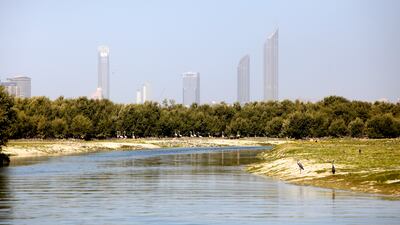At the end of his recent television series Blue Planet, David Attenborough offered one of the most resounding calls in the past few years for the need to do more to save our planet: "We are at a unique stage in our history. Never before have we had such an awareness of what we are doing to the planet, and never before have we had the power to do something about that... Surely we all have a responsibility to care for our Blue Planet."
This responsibility is a great one, and Mr Attenborough's statement implies we are not yet living up to it. He is right. Just this year, terrible wildfires, floods and marine accidents have devastated communities across the globe, as well as flora and fauna, which, unlike humans, bear no responsibility for today's crisis.
The UAE has a distinct desert climate, one that gives it stewardship over many such species. This has created a community of conservationists that pioneer research in an environmentally challenging part of the world. Emirati organisations also work abroad. The Mohamed bin Zayed Species Conservation Fund has provided almost 2,300 grants to projects supporting the globe's most threatened species. And now its managing director, Razan Al Mubarak, has been appointed to head up the International Union for the Conservation of Nature, the leading global organisation for conservation. Ms Al Mubarak is also managing director at the Environment Agency - Abu Dhabi.
This is an important moment for the UAE. Sheikh Mohammed bin Rashid, Vice President and Ruler of Dubai, paid tribute to Ms Al Mubarak on Thursday: "We are very proud of our national cadres, our environmental achievements and the daughters of our nation." In a tweet, Sheikh Mohamed bin Zayed, Crown Prince of Abu Dhabi and Deputy Supreme Commander of the Armed Forces, wrote: "I am confident her historic appointment will have a lasting, positive impact on international efforts to address the world’s greatest environmental challenges."
The news has wider significance beyond the environment. Ms Al Mubarak will be only the second woman to take up the role in the organisation's 72-year history. The appointment is another senior job going to an Emirati woman, as the country pursues a wider drive domestically to increase gender diversity in the public and private sectors. The thinking is simple: more diversity gives better decision-making and better results. In a field such as conservation, these benefits are particularly pressing. The health of our environment involves us all, so people from all backgrounds, genders and countries should be involved.
The UAE is a centre of such collaboration. On a global level, it has offered to host Cop28 in 2023, an international meeting that seeks to keep the world on track to meet the legally binding terms of the Paris climate agreement, which in 2015 pledged to control rising temperatures and create a zero-carbon future by 2050.
The more we all commit to being involved in protecting our planet, the less we resemble the disinterested humans of which campaigners such as David Attenborough warn. The success of Ms Al Mubarak is an important moment in this journey.
















